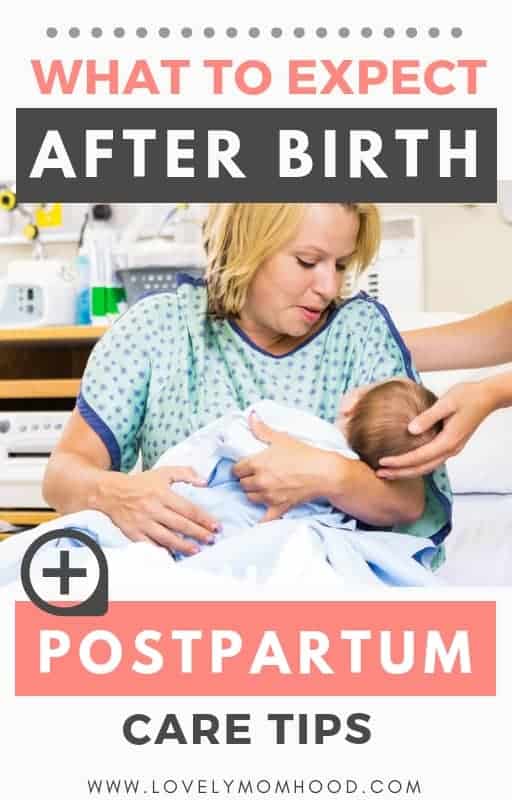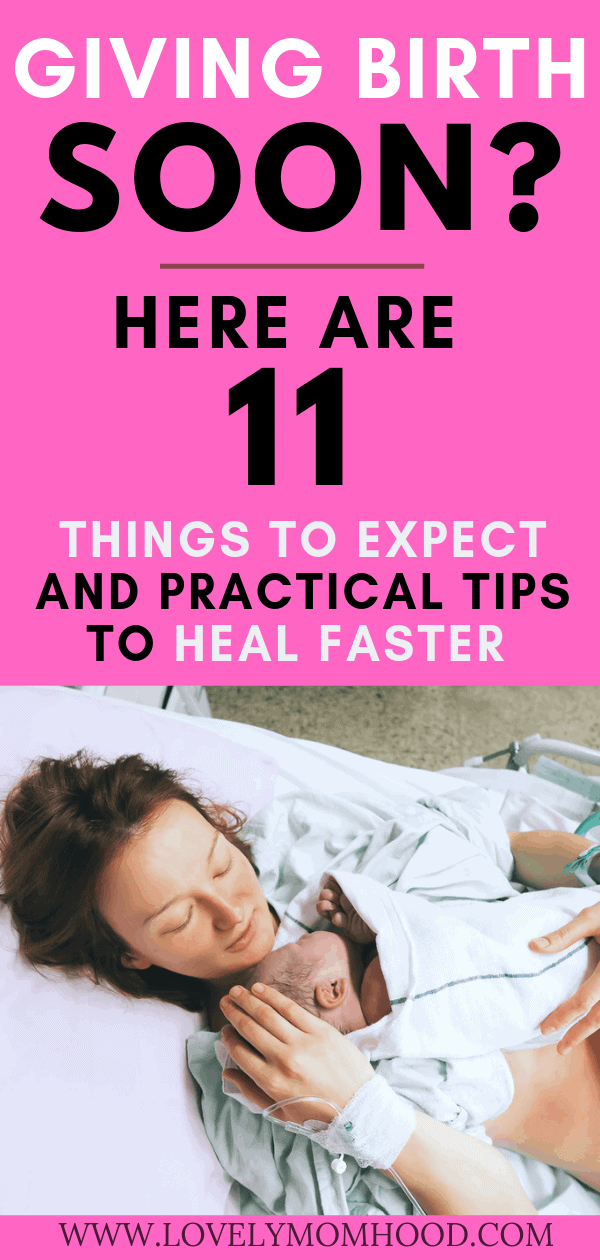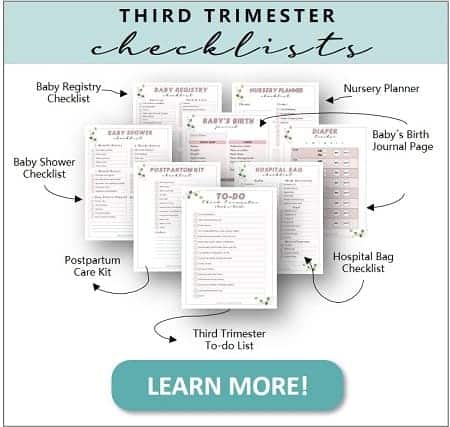11 Things to Expect After Giving Birth & Practical Tips to Heal Faster
One of the most consuming thoughts during pregnancy are thinking about labor and wondering “what to expect after giving birth”.
So, the time has come. You have waited what seemed like a lifetime to meet your precious little baby.
Congratulations, mama! You did it.
Now, it is when it all really begins. Your motherhood journey. With all the ups, the downs and all in between.
You survived the pregnancy fatigue and exhaustion, the pregnancy back pain, the heartburn and your million trips to the bathroom a day!
But now, as the next phase approaches, you will be faced with the first few days of postpartum recovery and you might be wondering:
“What can I expect after birth?”
“What changes will my postpartum body go through?
“What postpartum care tips can I implement to heal faster and be back to my normal self sooner?”
Well, not to worry.
Next, we will cover what to expect after giving birth and actionable tips to make the best out of your postpartum recovery.
Once you read it thoroughly, make sure you are ready for postpartum by going through The Ultimate Postpartum Care kit for New Moms (All-Natural and Non-Toxic) checklist.
11 Things to Expect After Giving Birth

1. Normal to feel emotional and overwhelmed
The very first thing to remember is that your body just underwent and enormous physical and psychological change.
At birth, once the placenta is expelled, hormonal changes make themselves known. These changes happen as a result of progesterone and estrogen level fluctuations.
Although not the case for every woman, these drastic drops in hormone are mostly responsible for the “baby blues”, exhaustion, mood changes, mom anxiety, and depression.
In addition, the incredible life realization that you are suddenly responsible for a human life can prove to be quite overwhelming initially.
Know that these are all normal feelings that will get better as the days and weeks pass.
Postpartum Recovery Tips:
- Make a concise effort to realize you an undergoing a normal process
- Ask for help if you need it
- Talk to your spouse and/or your doctor about how you are feeling
2. Heavy periods
Following birth your uterus will continue to expel bodily fluids.
The postpartum bleeding that happens after birth is called lochia and it can last approximately 4-6 weeks.
The heaviest discharge should happen in the first days/week and the color of your discharge should go from red to pink to brown to yellowish-white.
Small clots are normal. However, if you are going through more than one pad per hour and/or are passing large clots call your doctor right away.
Postpartum Recovery Tips:
- Kept disposable bed mats in bed for the first few days to prevent staining your bed sheets.
- Use pads, not tampons. For your healing body, (especially if you will be breastfeeding) I recommend to stick to as many natural and non-toxic postpartum care products as possible. For that reason, Rael’s Certified Organic Cotton Menstrual Overnight Pads are the perfect choice.
Here is the complete checklist for all-natural and non-toxin postpartum care kit must-haves.
3. Uterine Cramps
As a result of child birth, uterine contractions happen as an attempt to stop the bleeding from the area where the placenta was attached.
If you have opted to breastfeed you may notice uterine cramps intensify when the baby latches.
That happens as a result of oxytocin, which is the chemical messenger that causes breast tissue to contract. In effect, it also stimulates the uterus to contract.
Breastfeeding helps the uterus return to is original size faster.
Postpartum Recovery Tips:
- Use a heating pad
- Walk
- Take pain medication recommended by your doctor
4. Urinating might feel like torture
If you have a vaginal birth you might feel like a train just ran over your perineal area!
Okay, that was a bit much. But trust me, you will know exactly what I mean.
During the birthing process it is possible that there will be some tearing (internal, external), stretching, episiotomy, and so on. It can all vary depending on different factors such as baby size, baby positioning, first or subsequent pregnancies, pushing time, etc.
Although every mother experiences a different degree of discomfort, discomfort is still almost inevitable.
So, here are a few postpartum recovery tips and things to keep in your postpartum care kit to help with perineal discomfort:
- Use a squirt bottle during and after urinating to keep the urine from irritating torn skin
- Use numbing sprays recommended by your doctor
- Use Witch Hazel pads: I can’t recommend this product enough! It was my saving grace when I had my son to soothe and heal my peritoneal/hemorrhoids area)
- Perform regular Sitz Baths (organic)
5. Little diapers to change
When you were pregnant you probably heard a lot of people say, “get ready to change a lot of diapers”.
Although that might be true following the third day postpartum, the first 48 hours might not consist of much diaper changing.
That is because the baby’s first stool consists of meconium (green-black and sticky in consistency). Meconium stool can last between 1-3 days.
As the baby drinks more milk (breast or formula), they will start to produce more urine and stool.
Baby Tip:
- Keep a log of the baby’s wet and dirty diapers (hospitals will ensure the baby is having the proper intake an output before they are discharged from the hospital). Even after you go home, it is wise to keep an input and output log and take it with you to your first few prenatal visits.
Related article: The Best Natural Baby Products List (Skin Care, Bath, Diaper Care)
6. Sleep is a thing of the past
One of the most important things to expect after giving birth is the immediate change in your sleep pattern and frequency.
I think sleep deprivation is one of those things about motherhood that no one can prepare you for.
The first few days postpartum and the weeks that follow will most likely prove to be challenging for you (and your partner).
Your body is in utter discomfort, your baby requires around the clock care, and your hormones are going haywire.
It is important that you set aside everything that isn’t priority, temporarily. Making sleep a priority, as well as spending time your baby will be crucial the first few days.
The better rested you are the faster your body heals and the more likely you are to cope successfully with all the changes happening around you.
Postpartum Recovery Tips:
- Sleep when the baby sleeps
- Keep visitors to a minimum (if possible)
- Accept/ask for help (not having to worry about dinner or doing dishes can leave you more time to focus on sleep and baby)
7. Visitor overload
Everyone is going to want to meet the new baby. Family, friends, neighbors, co-workers, the hospital janitor… I mean everyone!
It is important you set boundaries ahead if time and that you and your husband set limits and expectations.
Proper rest is essential to carry on your duties as new parents, especially in the hospital.
In the hospital every minute is a precious time to rest since throughout the day (and night), nurses and other hospital staff are constantly coming in to check on you and baby.
Postpartum Recovery Tips:
- Set a visitor schedule
- If possible, tell your loved ones you rather them meet the baby once you are home
- Accept any help, you will need it (bring dinner, wash dishes, run errands, etc.)
Related Article: How to Survive the Newborn Days (A New Mom’s Guide)
8. Leaky everything and body changes
It is often surprising to new moms how many body changes they experience in such a short amount of time.
Contrary to pregnancy, where body changes happened gradually, the postpartum recovery process can feel overwhelming due to all the rapid changes.
You will be surprised to learn that your abdomen will still be swollen and stretched. In some instances, even giving the impression you are still pregnant.
You might still be swollen or develop new fluid retention (particularly if you had to receive intravenous fluids).
In addition, whether you are breastfeeding or not you might notice your breast might be leaking colostrum.
If you are formula feeding, your milk flow should reduce and disappear the first few weeks postpartum.
If you are breastfeeding your milk flow should increment as your baby continues to feed.
Oh and, urinary incontinence might also stick round for a bit.
Not to worry my friend, you will be back together in no time. Although some of us get to keep a few permanent souvenirs (scars, stretchmarks, and extra pounds).
It’s all good mama. Those are our beautiful battle scars of carrying and giving birth to humans lives.
No big deal , right? 😉
Postpartum Recovery Tips:
- Use a belly band to help keep things in place as your belly shrinks back to size. Many moms swear by the Belly Bandit, but you can also opt for a much inexpensive product such as the Amazon best seller Postpartum Girdle by Trendyline.
- Use warn compresses to help with breast discomfort
- Perform Kegel exercises to help strengthen your bladder muscles as help with incontinence
- Use disposable breast pads
9. Get moving
It is important to note that although exercise might be off limits for the first few weeks postpartum, being active is important.
Walking postpartum can:
- helps prevent clots from forming (particularly if you had a c-section)
- will help ease and prevent constipation
- can guard against baby blues
Constipation is a common postpartum issue caused by multiple factors (iron supplements, pain medication and dehydration). If hemorrhoids are in the picture, incorporating a stool softener to your postpartum recovery care kit will not be a bad idea.
With that said, not many stools softeners are created equal and some contain harmful chemicals.
Colace is said to be safe to take while breastfeeding (source), although you should always consult with your healthcare provider to before taking any medication.
Postpartum Recovery Tips:
- Walking around the house or even around the neighborhood (unless otherwise indicated by your doctor)
- Consider walking, increasing high fiber foods, and drinking plenty of water to relieve and prevent constipation.
1o. There is no instruction book
There are many guidelines, tips, books, and resources that can help you learn and understand the labor and postpartum process.
However, remember that your journey is yours alone, and it is best learned by practice and repetition.
Postpartum Recovery Tips:
- Trust you body, follow your instincts, ask for help if you need it… and the rest will follow.
11. Love will find its way
It might come to you as a shock that not all mothers bond with their babies right away.
Hopefully, that is not your case, as it isn’t the case for most moms.
However, if you find yourself in that predicament remember this:
- It doesn’t always happen right away
- You have a life-long journey to form a bond with your child
- It might or might not be attached to postpartum depression (in which case talking to a health care professional might be a good idea)
P.S: If you need help with getting ready for baby’s arrival, check out the Third Trimester Checklist Bundle.
★ More on Postpartum:
- What to Wear After Giving Birth at the Hospital (Head to Toe)
- The Ultimate Postpartum Care Kit for New Moms (All-Natural and Non-Toxic)
- A Complete Postpartum Care Plan for Faster Healing after Vaginal Birth
- 13 Postpartum Body Changes (Plus Care Tips and FAQ’s)
Final Thoughts
Having a child is one of the most exhilarating feelings in life.
It comes with a whole lot of emotions (good ones and not so good ones).
Although every woman’s journey is different, knowing what to expect after giving birth and having the resources to help you along your journey can truly make a difference.
I hope this information helps you along your postpartum recovery journey.
Wishing you a happy and healthy postpartum recovery.
What are looking forward to after giving birth?
If you already gave birth, how was your postpartum recovery? And what would you add to this, “what to expect after birth” list?
Pin for later…




